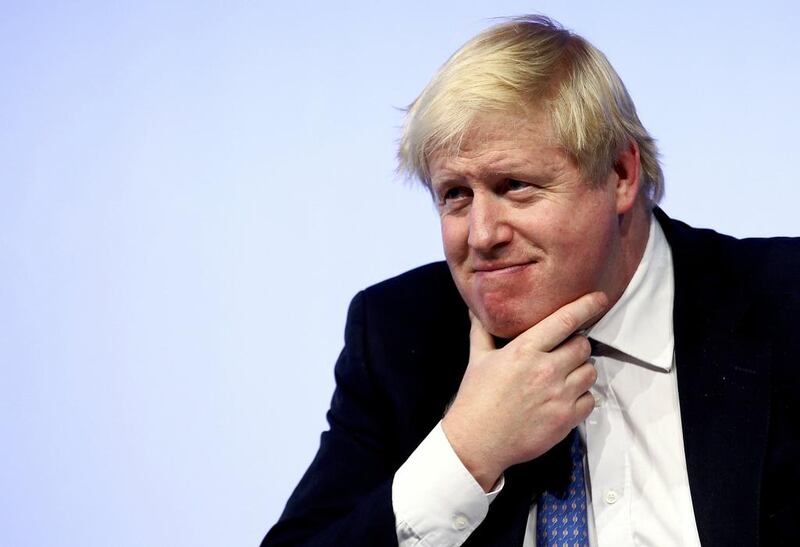It was billed as a Valentines Day embrace of the millions alienated by Britain's exit from the European Union (EU) but in the end Foreign Secretary Boris Johnson came closer to blowing a raspberry at hopes the country can keep close cross-channel ties.
The leading voice of the British exit campaign sought to address the anxiety of those who fear the breach will trigger a calamitous national decline in a central London speech on Wednesday.
Mr Johnson drew on family and personal experience to address the concerns of the so-called Remain-ers while utterly rejecting their hopes to remain in EU institutions. Instead he set out a vision of a liberal trading nation that would volunteer to work closely with the EU to maintain security, prosperity and social ties on its own terms.
"We must reach out to those who still have anxieties and I want to today anatomise at least some of the fears and to show to the best of my ability that these fears can be allayed and that the very opposite is true – that Brexit can be grounds for optimism, rather than fear," Mr Johnson told an audience at the Westminster think-tank Policy Exchange.
He decried a condition of "Brexchosis" that foresaw a gloomy future, claiming that the British genius for bucking historic trends would be vindicated. Taking on the three prominent arguments against the British breaking a 45-year liaison with the EU, Mr Johnson said the most common concerns were based on false assumptions.
The first of these was that the UK was protected as a small nation within the larger bloc of the EU. The second was that the vote to leave was a vote for nationalism and xenophobia. And finally that the UK will be economically worse off as a result of leaving.
"Whatever the superficial attractions of these points, they can be turned on their head today," he said. "Brexit need not be nationalist but can be internationalist."
While there are many who have called for a second vote on the terms of the British exit deal with EU, Mr Johnson cautioned against the temptation to launch another nationwide plebiscite that could see the country stay in the block despite the 2016 decision.
"[It would be a] disastrous mistake that would lead to permanent and ineradicable feelings of betrayal," he said. "Let's not go there."
_________________
Read more:
[ Brexit transition ‘not a given’, says EU’s Barnier ]
_________________
Sarah Wollaston, a Conservative MP, said she was worried by the "optimism bias" senior ministers like Mr Johnson displayed over Brexit when so many details of the split had not been worked out. "Writing off concerns as somehow obstructing the grand vision won’t help," she said.
The British chief diplomat said London would make a sincere offer of co-operation with the EU on security, pointing out the UK had traditionally protected European nations.
"Our commitment to the defence of Europe is unconditional and immovable although we represent 13 per cent of the EU population, we represent 20 per cent defence spending."
Not all were convinced by his argument that Brexit would be liberalising, pointing out that leaving could erect barriers to trade that had been erased by Europe's single market.
"Putting up barriers to the movement of trade and people and suggesting that the identity of citizens can only be national is not liberal – it's quite the opposite," declared Guy Verhofstadt, the Brexit representative for members of the European Parliament.
There was also nerves at 10 Downing Street over the potential impact of the speech. Prime Minister Theresa May will give her own vision at a security summit in Munich on Saturday.
Tom Newton Dunn, the political editor of The Sun newspaper, indicated on Tuesday night that the speech was undergoing last-minute drafting.
"Nerves in No 10 tonight about Boris's big speech tomorrow – two drafts (and counting) have already been submitted for vetting and rewriting," he tweeted.
Jean Claude Juncker, the European Commission president, rejected the central premise that London was escaping a super-state run from Brussels. "Some in the British political society are against the truth, pretending that I am stupid, stubborn federalist," he said. "I am strictly against a European superstate. We are not the USA, we are the EU. This is total nonsense."
Mr Johnson's bottom line was, however, clear. That Britain should make a clear break with European law-making bodies and seek free trade deals around the globe.
"The British people should not have new laws imposed on them from abroad when they have no power to elect those who makes those laws," he said.
Tom Brake, an opposition MP, said that Mr Johnson's rhetorical flourishes could not disguise a lack of substance in his speech.
“As ever, Boris managed to find time to practice a dead language but failed to tackle the live issues,” he said.






